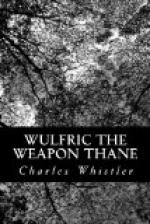Now as to our own folk. My mother is gone, but first she stood for Osritha at the font, naming her again with the name by which I learnt to love her, for I would not have it changed.
Gone also has good old Ingild; but before he went he and I were able without fear of hindrance to build a little church of squared oaken timbers at Hoxne, for the heathen worship died quickly from among our Danes. On that church, Cyneward, who was Raud, and is our well-loved steward, wrought lovingly with his own hands side by side with the good monk who baptized him. And he has carved a wondrous oaken shrine for the remains of our martyred king, whereon lies the bracelet that Ingvar sent in token that Eadmund had conquered him who was his slayer.
How fared Ingvar I know not, for soon the incoming tide of Danes slackened, and I heard no news of him; and, as he said, never did he set foot on English shores again.
Egfrid and Eadgyth are happy in their place at Hoxne, and on them at least has fallen no shadow of misfortune from that which came of their passing over the Bridge of the Golden Spurs—the Golden Bridge as our folk call it now.
Yet it needed no words of Ingvar’s to keep the memory of that day’s work alive in the minds of our people. Never so long as the Gold Brook flows beneath that bridge will a bridal pass churchwards over its span, for there, but for such a crossing, Eadmund the king might have bided safely till Ingvar the Dane had passed and gone.
Little use is there in grieving over what might have been, but this I know, that in days to come forgotten will be Ingvar, and English will have become his mighty host, but in every English heart will live the name of Eadmund, who died for faith and country.
NOTES.
i Ran: the sea goddess or witch of the old mythology, by whose nets drowning men were said to be entangled.
ii The Jarl ranked next to the king, and was often equally powerful. Our English title “Earl” is derived from this.
iii A small wharf.
iv A lay brother of the monastery of Hackness, near Whitby, who rendered the Sacred Histories into verse about A.D. 680.
v Now Whitby. The present name was given by the Danish settlers.
vi As if under the shadow of coming death.
vii The Viking ship of war, or “long ship”.
viii The usual Scandinavian and Danish greeting: “Health”.
ix After expulsion from his bishopric of York by King Egfrid.
x Mail shirt.
xi The fine allowed as penalty for killing an adversary in a quarrel, or by mischance. The penalty for wilful murder was death.
xii Nidring, niddering, or nithing, may be beet expressed by “worthless “. It was the extreme term of reproach to a Saxon.
xiii The “Lodbrokar-Quida”, which is still in existence. By some authorities Ragnar is said to have been the father of Ingvar and Hubba, but the dates are most uncertain.




